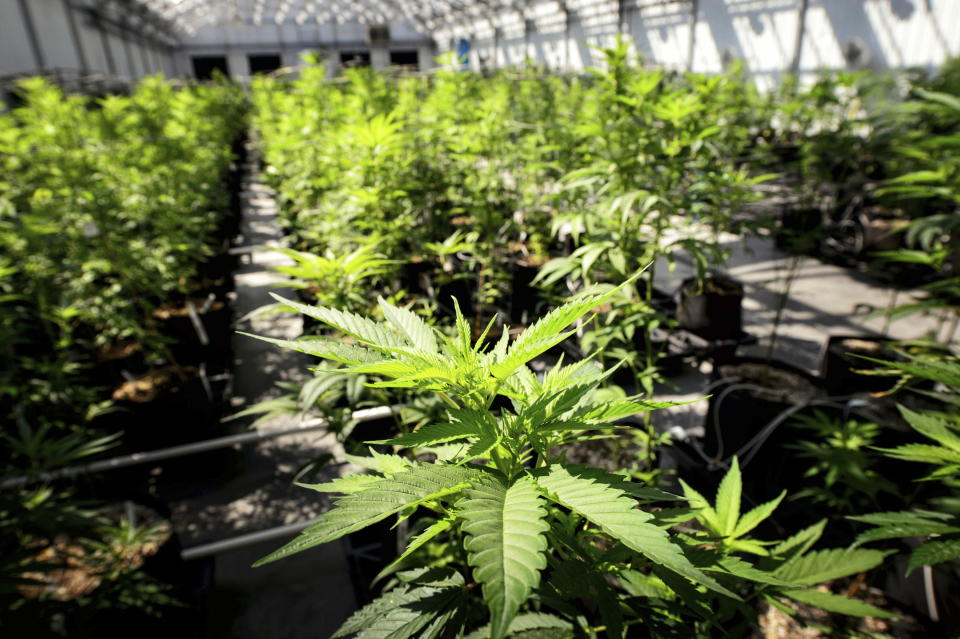Pot companies are reporting profit on unsold bud, and it's totally legal

Cannabis companies are free to book profit on pot that isn’t finished growing and hasn’t yet been sold. It’s all above board thanks to an accounting rule traditionally applied to assets like live hogs and grapes still on the vine.
Under International Financial Reporting Standards (IFRS), companies in the agricultural sector pre-book profit for these “biological assets” while they are still growing. The unsold inventory impacts net income as if it were revenue, once estimated selling costs are deducted.
It means cannabis companies can, in theory, report net income in a quarter without a single sale.
Craig Wiggins, one-third of an independent analysis team called TheCannalysts, feels the accounting convention makes sense when applied to cattle — cannabis, he says, is another story.
Wiggins worries too many assumptions about an industry still in its infancy are being fed into these company-determined valuations, and expects many retail investors don’t understand the risk of write-downs if the real-world cost-per-gram falls short.
“There are far more examples of LPs (licensed producers) being too aggressive in pre-booking profits than the reverse,” he told Yahoo Finance Canada. “Canopy (WEED.TO) has had to reverse GoB (gain on biologicals) that they took at each of the last two year-ends.”
Futures contracts and the spot market for old school commodities like corn and soybeans help companies predict prices down the road. Not the case for cannabis, where no such pricing exists. Demand and prices for pot are much larger question marks.
Paul Rosen, CEO and chairman of the cannabis-focused financing company Tidal Royalty Corp. (RLTY-U.CN) and co-founder of Cronos Group Inc. (CRON.TO), said the biological assets rule is widely-accepted.
“Of the things that would keep me up at night about investing in the cannabis industry, that would not be one of them,” he told Yahoo Finance Canada. “It’s not like a big hush-hush secret. It’s just not that controversial in my opinion.”
Rosen admits the practice is likely not very well-known among the often young and inexperienced investors that piled into pot stocks ahead of recreational legalization in Canada on Oct. 17. He also concedes that cannabis companies and conventional agriculture make for odd bedfellows.
“Is cannabis ultimately agriculture? Or is it industrial, biotech, or CPG (consumer packaged goods)?,” Rosen said. “There are all sorts of elements in the cannabis ecosystem”
Rosen, who is by most measures a veteran investor in the nascent cannabis sector, has faith that regulators are doing an adequate job of protecting investors, and feels licensed producers are doing their part by making ethical decisions.
He also expects uncertainties around demand and prices will diminish as the industry works through its initial growing pains.
Wiggins, who boasts three decades of experience in commercial lending, and runs a boutique supply chain financing company, calls the IFRS measures “voodoo.”
His fellow Cannalysts, commodity trader Andrew Udell and Brock University biotechnology PhD candidate Graham Jones, recently emerged from anonymity on Reddit. They host a podcast about cannabis investment analysis.
It seems like Bay Street is listening.
Shortly after the Bank of Montreal (BMO.TO) became the first of the big Canadian lenders to wade into the cannabis sector earlier this year, TheCannalysts reached out and set up a meeting.
“We wanted to understand what they knew about the sector. We showed them what we knew about the sector. I think we pointed out a number of things that they weren’t aware of,” Wiggins said.
TheCannalysts have also arranged talks between five of Canada’s biggest licensed producers and Export Development Canada to discuss international business opportunities.
For Wiggins, the biological assets rule underscores the the need for cannabis investors to evaluate non-IFRS measures, his favourite being adjusted EBITDA (earnings before interest, taxes, depreciation, and amortization), and conduct their own trend analysis.
“If you’re reading a company’s press releases you’re not getting the fully story,” he said. “It usually focuses on the good stuff. At TheCannalysts, we like to focus on the bad stuff. That’s where you figure out where the rubber hits the road.”
Rosen too acknowledges that the commentary of exuberant cannabis company executives often ought to be taken with a grain of salt.
That said, until the recent pot stock pull-back, he was comfortable valuing companies in the sector at up to 200-times revenue.
“We’re genuinely bullish,” Rosen said. “Maybe we are all drunk on our own recipes, but we really believe in what we are doing.”
Wiggins also anticipates long-term value, but he’s calling for near-term “carnage” as weak post-recreational legalization numbers roll in.
The self-described “slayer of gain on biological asset voodoo” hopes the reckoning he sees on the horizon will encourage closer studying of cannabis company fundamentals.
“You find out that I booked this product at $6 (per gram), not including my selling price. Now I’ve got to sell it to the government wholesaler at $4,” he mused. “We are are going to see things start falling apart, and wheels falling off certain carts.”
Download the Yahoo Finance app, available for Apple and Android.

 Yahoo Finance
Yahoo Finance 
